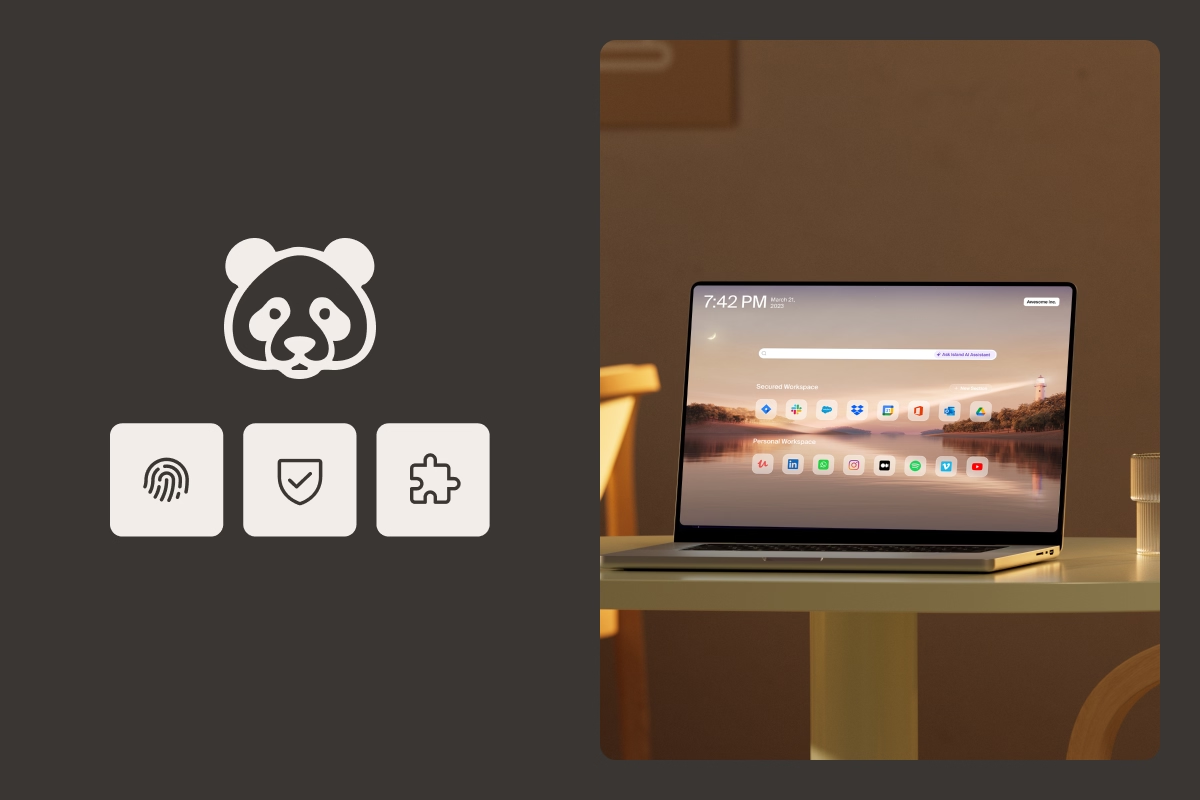How Pfizer Secures its Global Workforce with the Island Enterprise Browser
Learn how Pfizer uses the Island to protect sensitive web applications and cut costs without overhauling its legacy systems.

“Our use case was around protecting some sensitive web applications. Then we started realizing through conversations with Island just how many different use cases there were.”— Brian A. Coleman, Head of Insider Risk, Digital Forensics, and Information Security, Pfizer
As a global biopharmaceutical giant, Pfizer faces the challenge of protecting sensitive web applications and critical data across a sprawling, globally distributed workforce.
To maintain productivity while meeting stringent security demands, Pfizer turned to a solution that seamlessly integrated into its operations: the Island Enterprise Browser.
Today, Island seamlessly integrates security and visibility into Pfizer’s legacy applications and systems, without missing a beat in workforce efficiency.
Here's how Island is transforming Pfizer's approach to global security.
A game-changer for security and efficiency
Pfizer needed to protect sensitive web applications without overhauling its legacy systems – systems which would be too difficult to modify or secure without extensive effort and expense.
Pfizer’s Head of Insider Risk, Digital Forensics, and Information Security, Brian A. Coleman, realized that while traditional consumer browsers are “free,” they lack the necessary security and control required for enterprise environments.
Then he discovered Island’s Enterprise Browser. Island uniquely layers security over existing applications with minimal disruption – in stark contrast to both unsecured consumer browsers as well as to most security solutions on the market, which demand significant re-coding.
So, Pfizer made the leap – eventually making Island a core component of their global IT security strategy.
Island seamlessly integrated into Pfizer’s workflow, maintaining user experience while adding significant security enhancements. “You can apply different policies to different groups of users,” says Coleman. “If you don’t have great RBAC for a legacy application, you can now create RBAC through the browser.”
Initially focused on securing sensitive web applications, Pfizer quickly realized Island’s broader potential—from enabling secure BYOD policies to replacing costly legacy systems like VDI. Today, the Island Enterprise Browser acts as an essential "last-mile" security tool for Pfizer.
Seamless integration with legacy systems
“You can enforce two-factor authentication, use integrations with password management solutions. There’s a lot of security capabilities that became apparent to us.”
What truly set Island apart for Pfizer was its ability to meet three critical needs across their organization: enhanced security, real-time visibility, and improved data control—all without disrupting user workflows.
- Granular controls for sensitive applications. Pfizer uses Island to dynamically enforce policies like two-factor authentication and secure password management, directly within the browser. For instance, Pfizer used Island’s RBAC feature to secure legacy applications without rebuilding them, dynamically enforcing security policies based on user roles.
- Visibility and data protection. With Island, Pfizer’s security team can monitor user activity in real time, from copying and pasting to downloading and uploading data. Inline prompts reminding users of security policies, preventing inadvertent data leakage. “This allows you to inject a decision point for users,” says Coleman, “and a lot of times people back out from potentially risky actions.”
- Enhanced forensics and compliance. Island’s digital forensics capabilities enable Pfizer to trace actions within the browser, critical for insider threat investigations. “The visibility that Island gives us is very valuable,” says Coleman. “It becomes very powerful when some legacy platforms don’t have as robust logs as we’d like to have.”
Key benefits for global enterprises — and beyond
Armed with these key benefits and more, Pfizer has now deployed Island globally, ensuring seamless functionality for its complex applications while upholding strong security across its distributed workforce.
Here are just a few of the benefits Pfizer is already seeing from implementing the Island Enterprise Browser:
- Cost savings: Pfizer has dramatically reduced tools like VDI and VPN, reducing costs while maintaining or improving security.
- Improved user experience: Island enables a seamless browsing experience, without users needing to manage complex security measures. For instance, sensitive application access has become smoother due to Island’s built-in protections. “You can allow people to browse the web as they normally would,” says Coleman, “but when it comes to a critical application, enforce the security policies.”
- Security enhancements: Pfizer is enjoying enhanced control over data movement, including download/upload restrictions, and browser-based encryption control, enabling the company to ensure compliance with various global privacy regulations.
The Island Enterprise Browser: Clear ROI for global organizations
The Island Enterprise Browser has changed the game for Pfizer, a global pharma powerhouse. More than a browser, Island is a security platform built for the enterprise, providing Pfizer with granular control, visibility, and integration into their existing systems without compromising productivity.
And Island isn't just for large enterprises. Any organization with a globally distributed workforce, legacy systems, or critical web applications can benefit from the granular, seamless controls Island has to offer. Island is more than just a browser—it’s the last-mile security solution that delivers both productivity and peace of mind.
“People have to give it a real look,” says Coleman. Despite initial skepticism about paying for a browser, he says, “When you start looking at potential savings and improved security, you’ll see the value.”
.svg)





.svg)
.svg)
